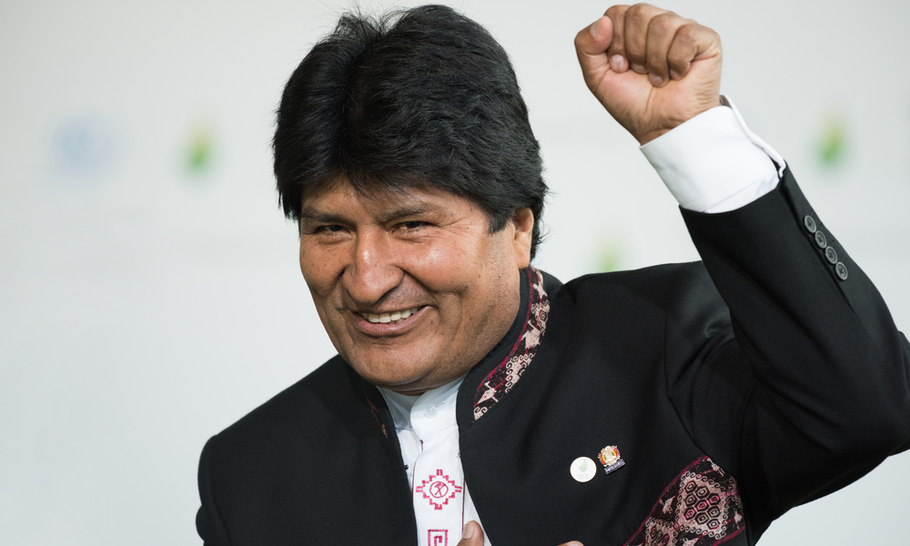How Morales lost Bolivia

Evo Morales (Shutterstock)
The ascent of Evo Morales from pauper to president of Bolivia is rooted in the resilience of the country’s indigenous and campesino social movements.
The coup that toppled his administration last month is bound to have serious repercussions as Bolivia prepares for a major shift in leadership from a leftist government that worked for low-income and marginalised communities, to an ultra-conservative right-wing regime.
His legacy of social inclusion and economic growth looks set to be reversed with the emergence of a conservative opposition that leans towards evangelical Christianity with policies that appear shrouded in anti-indigenous racism.
President Jeanine Áñez has been quick to set the tone by not appointing a single indigenous person to her newly-formed cabinet. She has severed ties with other key leftist allies in the region, including Venezuela’s Nicolas Maduro, and ordered around 700 Cuban doctors to leave Bolivia.
Her anti-indigenous sentiments were expressed in a Tweet: “I dream of a Bolivia free of satanic indigenous practices. The city is not for the Indian: they should go to the highlands or the desert.”
Morales, who is of Aymara and Quechua descent, comes from a family of coca growers and his party, Movimiento al Socialismo (MAS), which he formed in 1988, is premised on the struggles of the coca-growing communities.
Some of the core issues Morales championed were the nationalisation of key industries, including oil and gas, along with other major social and economic reforms, and the introduction of “pluri-nationalism” in the Constitution. This was specifically geared to include indigenous communities in a country where almost 60 per cent of nearly 11 million people identify themselves as belonging to indigenous groups.
Moving away from the elitist, European-descended leaders in the past who had failed the indigenous population, Morales’s 2006 landslide win showed just how ready these communities were for change.
Through his 14-year political career, Morales delivered significant gains for the indigenous communities, with policies that chipped away at institutionalised racism by generating employment opportunities with state-private business partnerships.
According to an October report by the Center for Economic and Policy Research, (CEPR), a Washington DC-based think-tank, when Morales came to power Bolivia’s unemployment rate was 7.7 per cent. In two years it dropped to 4.4 per cent and stayed around that level until 2018.
In the first eight years of Morales’s presidency, revenue from hydrocarbons multiplied seven-fold to $4.95 billion. Energy, transport, communications, and infrastructure were all prioritised for development by his administration. The poverty rate declined to 35 per cent in 2018, from 39 per cent in 2014, according to the World Bank.
“Bolivia has shown that it is possible for a small, poor country in South America to make substantial economic and social progress, with macroeconomic stability, solid income growth, and redistribution, through a mix of state-led, heterodox economic policies, and markets,” Mark Weisbrot, CEPR’s Co-Director and co-author of the report noted on the think-tank’s website.
In addition, Bolivia’s real per capita GDP has grown at nearly double the rate of the rest of Latin America, leading to balance of payments surpluses that helped maintain political and social stability.
This didn’t come cost-free, however, as a dip in commodity prices, which underpin the economy, and a resort to deforestation and mining, alienated many groups that should have been a natural base for Morales.
His decision to push through a change to the Constitution to do away with presidential term limits also hurt him, and his run for a fourth term in October was tainted by accusations of electoral fraud that compounded widespread dissatisfaction with the weakening economy.
On October 20, Bolivia’s Supreme Electoral Tribunal suspended the vote count for almost 24 hours. It then granted Morales a lead of more than 10 per cent, enough to win the first round. The opposition and the Organisation of American States (OAS) — known to have meddled in Leftist government processes across Latin America and the Caribbean — cried foul, tarnishing Morales’s win.
Following an investigation, the OAS said on November 10 that it had found irregularities in the vote, though it has yet to offer concrete evidence. Morales attempted to set up a second election, but by then the military had stepped in and asked him to resign.
Morales was the last standing leftist leader in the region. He came to power along with other key leftist figures in South America, including Venezuela’s Hugo Chávez, Ecuador’s Rafael Correa, and Argentina’s Cristina Fernández de Kirchner.
Soon after stepping down, Morales said: “My sin was being Indigenous, leftist and anti-imperialist.”




